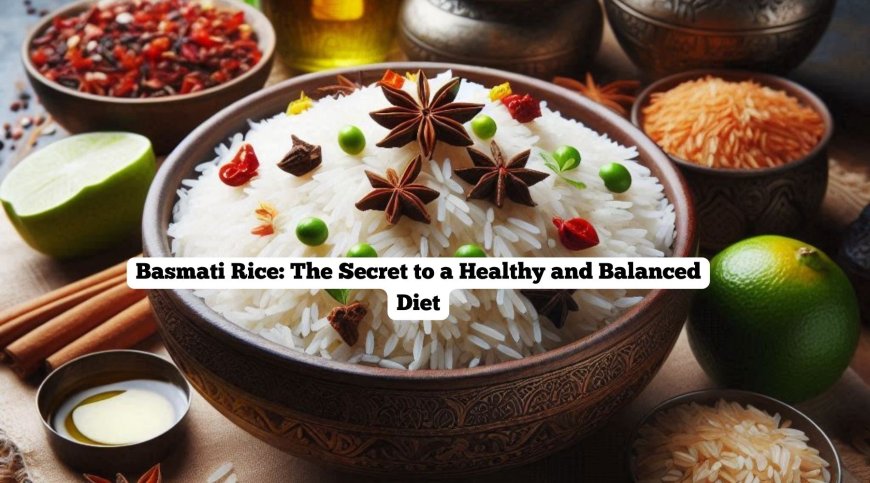Basmati Rice: The Secret to a Healthy and Balanced Diet
In the quest for a healthy and balanced diet, incorporating the right grains can make a significant difference. One such grain that has stood the test of time is Basmati rice. Known for its unique aroma, long grains, and exquisite taste, Basmati rice is not just a staple in many kitchens but also a powerhouse of nutrition. Let's explore why Basmati rice should be a regular part of your diet.

In the quest for a healthy and balanced diet, incorporating the right grains can make a significant difference. One such grain that has stood the test of time is Basmati rice. Known for its unique aroma, long grains, and exquisite taste, Basmati rice is not just a staple in many kitchens but also a powerhouse of nutrition. Let's explore why Basmati rice should be a regular part of your diet.
What is Basmati Rice?
Basmati rice is a variety of long-grain rice that is traditionally grown in the Indian subcontinent. The word "Basmati" comes from the Sanskrit word "Vasmati," which means fragrant or aromatic. True to its name, Basmati rice is known for its distinctive, pleasant aroma and flavor. It is available in white and brown varieties, each offering unique health benefits.
Nutritional Benefits of Basmati Rice
- Low Glycemic Index: One of the standout features of Basmati rice is its low glycemic index (GI). Foods with a low GI are digested and absorbed more slowly, leading to a gradual rise in blood sugar levels. This makes Basmati rice an excellent choice for individuals with diabetes or those looking to manage their blood sugar levels.
- Rich in Fiber: Brown Basmati rice, in particular, is high in dietary fiber, which aids in digestion and promotes a healthy gut. Fiber also helps in maintaining a feeling of fullness, making it easier to control portion sizes and avoid overeating.
- Vitamins and Minerals: Basmati rice is a good source of essential vitamins and minerals, including thiamine (Vitamin B1), niacin (Vitamin B3), and magnesium. These nutrients play a crucial role in energy production, maintaining a healthy nervous system, and supporting muscle function.
- Low in Fat and Cholesterol-Free: Basmati rice is naturally low in fat and contains no cholesterol, making it a heart-healthy option. Incorporating Basmati rice into your diet can help manage cholesterol levels and reduce the risk of heart disease.
Basmati Rice and Weight Management
For those aiming to maintain or lose weight, Basmati rice can be a valuable addition to your diet. Its low GI and high fiber content help regulate appetite and prevent sudden spikes in blood sugar, reducing cravings for unhealthy snacks. Additionally, Basmati rice provides sustained energy, making it easier to stay active and maintain a balanced lifestyle.
Versatility in Cooking
Basmati rice is incredibly versatile and can be used in a variety of dishes, from traditional Indian biryanis to simple rice bowls. Here are a few ideas to incorporate Basmati rice into your meals:
- Biryani: A flavorful and aromatic rice dish cooked with spices, vegetables, and your choice of protein.
- Rice Salad: A refreshing salad made with cooked Basmati rice, mixed vegetables, and a light vinaigrette dressing.
- Stir-Fry: A quick and healthy stir-fry with Basmati rice, colorful vegetables, and lean protein like chicken or tofu.
- Rice Pudding: A delightful dessert made with Basmati rice, milk, and sweetened with a touch of honey or maple syrup.
Tips for Cooking Perfect Basmati Rice
- Rinse Thoroughly: Rinse Basmati rice under cold water until the water runs clear to remove excess starch, which can make the rice sticky.
- Soak Before Cooking: Soak the rice for 20-30 minutes before cooking to ensure even cooking and fluffy texture.
- Use the Right Water Ratio: Typically, the ratio of water to rice is 1.5:1 for perfect Basmati rice. Adjust the water slightly depending on your preference for softer or firmer grains.
- Cook with Care: Bring the water to a boil, then reduce the heat to low, cover, and simmer until the water is absorbed and the rice is tender.
Conclusion
Incorporating Basmati rice into your diet can provide a delicious and nutritious foundation for a variety of meals. Its unique flavor, combined with numerous health benefits, makes it an ideal choice for those seeking to maintain a healthy and balanced diet. So, next time you're planning your meals, consider adding Basmati rice to the mix and enjoy its delightful taste and healthful properties.

 shrilalmahal
shrilalmahal 










